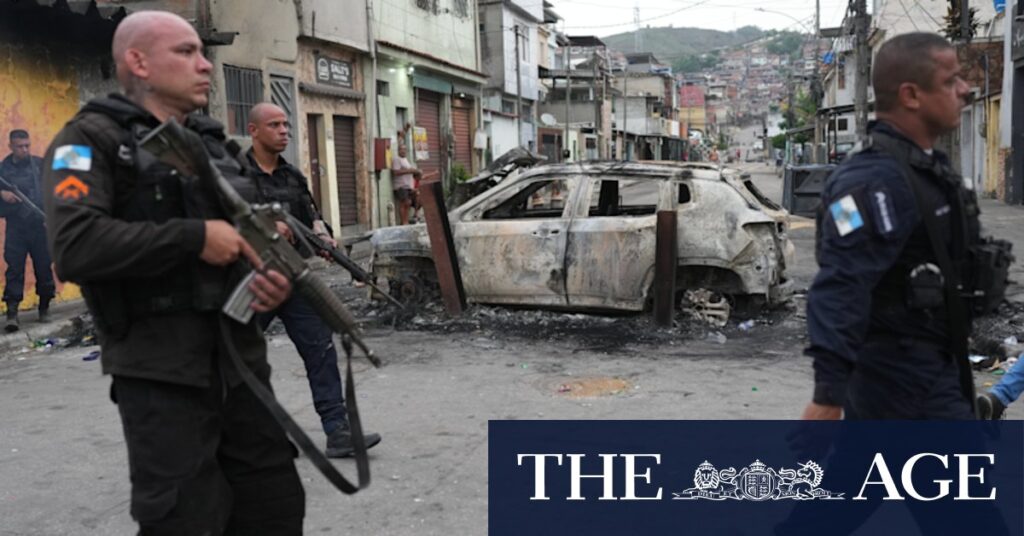
In a dramatic escalation of Brazil’s ongoing battle against drug trafficking, approximately 2,500 police officers and soldiers launched a massive raid on a notorious drug gang in Rio de Janeiro on Tuesday. The operation resulted in the arrest of 81 suspects and left at least 64 people dead, according to officials.
The raid targeted the infamous “Red Command” gang within the sprawling favelas of Complexo de Alemão and Penha. The operation involved officers utilizing helicopters and armored vehicles, highlighting the severity of the confrontation. The state government reported that criminals retaliated by using drones to attack police forces, sharing a video of a drone firing a projectile from the sky.
Unprecedented Violence and Disruption
Rio de Janeiro State Governor Cláudio Castro revealed that the death toll, which includes four police officers, was more than double that of Rio’s previous most deadly police operation. As the operation was still ongoing, officials warned that the number of casualties could rise.
Social media footage captured the chaos as fire and smoke billowed from the favelas, accompanied by the sound of gunfire. The city’s Education Department announced the closure of 46 schools across the affected neighborhoods, while the nearby Federal University of Rio de Janeiro canceled night classes and advised people on campus to seek shelter.
In response to the raid, suspected gang members blocked roads in northern and southeastern Rio. Local media reported that at least 50 buses were commandeered for use in the blockades, according to Rio Onibus, the city’s bus organization. The clashes severely disrupted daily life, affecting schools, medical facilities, and traffic across several neighborhoods.
Historical Context and Ongoing Efforts
Rio’s favelas are densely populated, low-income settlements that have long been plagued by violence and crime. The operation on Tuesday marked the largest-ever targeting of Comando Vermelho, following a year-long investigation. Governor Castro stated that authorities aimed to execute 250 arrest and search warrants.
Historically, police have conducted large-scale operations against criminal groups ahead of major international events in Rio. The city hosted the 2016 Olympics and is set to host the 2024 G20 summit and the BRICS summit in July. Next week, Rio will welcome the C40 global summit of mayors tackling climate change, along with Prince William’s Earthshot Prize, featuring celebrities such as pop star Kylie Minogue and four-time Formula One world champion Sebastian Vettel.
Reactions and Future Implications
As the dust settles, the impact of this operation on Rio’s communities and its broader implications for Brazil’s fight against organized crime remain to be seen. The use of drones by criminals marks a new level of sophistication in their tactics, raising concerns about future confrontations.
Experts suggest that while such operations can temporarily disrupt criminal activities, they often fail to address the root causes of crime in favelas, such as poverty and lack of opportunities. The Brazilian government faces the challenge of implementing long-term strategies to improve living conditions and provide alternatives to crime for residents.
As Rio prepares for upcoming international events, the spotlight will be on how authorities manage security and public safety. The recent raid underscores the complexities of maintaining order in a city grappling with entrenched criminal networks.
In the coming days, authorities are expected to provide further updates on the operation’s outcomes and any additional measures to prevent retaliation from criminal groups. The international community will be watching closely as Rio navigates this critical period.







